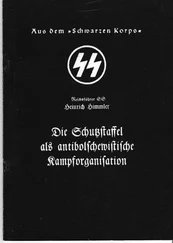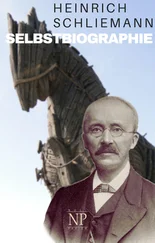The S.S. leaders, whether they were intellectuals or not, had to submit to these historical charades in order to please Himmler, who gave more and more of his time to the detailed study of such useless history as his power increased. Himmler had in him the makings of a recluse, a ruthless anchorite devoted to his studies and determined to remake mankind in the particular image conjured up by his eccentric scholarship. The great tragedy of our time is that for several years he possessed the power to experiment in Europe at the cost of millions of lives.
He had become by now violently anti-Catholic and anti-Christian, substituting for the faith in which he had been reared a facile acceptance of those particular superstitions, such as astrology, that suited his Germanic prejudice. 12The Catholic Church came under attack in Das Schwarze Korps (The Black Guards), the illustrated weekly journal of the S.S. which began publication in April 1935 with the S.S. chronicler Gunter d’Alquen acting as editor under the special direction of Heydrich.
Himmler founded at the same time an institution known as the Ahnenerbe (Ancestral Heritage) for research into Germanic racial origins. 13Himmler made himself President of this Society, and its director was Professor Dr Walther Wuest, whom Himmler made an honorary captain in the S.S. The institute had a special task to link the present with the past by investigating the claims of the Nordic peoples of belonging to Indo-Germanic stock and to revive the spiritual and cultural heritage of this, the noblest race on earth. Ahnenerbe undertook, for example, extensive archaeological excavations of Germanic remains at Nauen and Altkristenberg, and even sent an expedition to Tibet. To pay for these researches Himmler turned once more to his friend Keppler, Hitler’s economic adviser, who founded a society of industrialists called the Friends of the Reichsführer S.S. which subscribed large sums to support Himmler in this work.
The supervision of the concentration camps passed to Himmler and the S.S. after the Roehm purge. Heydrich took charge of this work and made Eicke, now a brigadier-general of the S.S., his Inspector of Camps. The Death’s Head Unit, which Eicke had trained for Himmler, took charge of those camps which had been established on a permanent basis, such as Dachau, the so-called model camp in the south, Buchenwald, founded centrally near Weimar in 1937, and the northern camp of Sachsenhausen, near Berlin-Oranienburg. The base camps and their subsidiaries multiplied with the development of tyranny until their establishment reached nearly a hundred centres before the war, and afterwards extended over the whole of occupied Europe with the spread of Hitler’s conquests.
The record of these camps, in which between five and six million Jewish victims alone are estimated to have died by the end of the war, became the ultimate indictment of the Nazi system. Their continued existence over a period of twelve years makes our century, which should have been the most civilized, one of the worst in human history. A pathological fear of the camps and what was done in them to helpless people spread all over Germany and occupied Europe; even to admit knowledge of them at the time they were in operation became a lasting inhibition in the minds of most German people. Open recognition of detailed facts which were first made known at the International Military Tribunal in Nuremberg after the war and have been elaborated at subsequent trials is still avoided by the majority of people both inside and outside Germany.
The principal author of this extended act of human degradation was Himmler, who believed his task to be a necessary duty in which human feeling had no proper place. Suffering was inevitable when a mass-deterrent on this scale had to be created, and he believed the guardians in the camps were more the victims of necessity than those whom they oppressed. It would be quite wrong to think that Himmler had no conscience and no pity; but his real pity was given to the men and women of his Death’s Head units who had to have this fearful burden placed upon them. It became a constant anxiety that preyed upon him and eventually destroyed his health. His feelings about this, the worst of all his tasks, he was eventually to let loose on Kersten, the man who relieved his pain and became as a result the confidant of his most secret thoughts.
During this early phase, however, Himmler took great pride in the concentration camps. In October 1935, after receiving birthday congratulations from Hitler, he conducted Hess and other distinguished guests round the show places of Dachau, where the following month a unit of the S.S. additional to the Death’s Head specialists were to be housed in cheerful barracks built for them by the prisoners. This new unit shared some garrison duty with the camp guards, but their main purpose was to undergo military training. The base camps had married quarters attached to them, and even in the worst phases of the history of the camps during the war the wives and families of the S.S. guards had to accustom themselves to the experience of living near these centres of torture and death. 14
After the Roehm purge, the para-military nature of the S.S. was soon to be developed. Hitler had to watch not only those who were critical of his regime abroad and might have been prepared to take action against him, but also the High Command of the German Army, which still had the remnants of power to depose him if the will could be turned into the deed. The period of his gradual open defiance of the Allies and of the terms imposed by them in the Treaty of Versailles was about to begin, and the pattern of training for the S.S. changed in accordance with the stages through which Hitler’s successful defiance of the Allies and his subjection of the High Command were to pass. In January 1935, he regained the Saar by plebiscite; in March he announced conscription for the Army and the open establishment of an Air Force, Goring’s Luftwaffe; in June Ribbentrop, then Ambassador in Britain, succeeded in bringing off the Naval Pact which permitted Germany to develop a limited naval fleet; while in December came the shady dealings over Ethiopia which were in the end to leave Mussolini free to proceed with its conquest.
Hitler decided the S.S. should provide a full division of men trained for war, and he induced the Army to accept this anomalous position by making it part of the plan for conscription. In November 1934 a lieutenant-general in the Army, Paul Hauser, was selected to take charge of this aspect of S.S. training. Hauser took over Heydrich’s leadership school at Bad-Toelz and turned it into the first of a number of highly disciplined establishments for training officer cadets. According to Reitlinger, Hauser after the war regarded his S.S. school at Bad-Toelz as an ideal model for the training of NATO officers. His school represented the beginning of Himmler’s Waffen S.S., the military section of the S.S. corps which was later to become an international force when the S.S. spread its recruitment among the more ‘suitable’ races in the conquered territories.
Himmler’s relations with Hitler, with Goring, Frick, and Schacht, the banker who became Hitler’s Minister of Economics in 1934, with the Army High Command, and above all, with his principal officer, Heydrich, were governed by the opportunism which controlled the actions of all the Nazis, whatever the level of the position they held in the Party or the leadership. Opportunism is the peculiar vice of politicians, and the Nazi mentality, with its complete rejection of any kind of political morality, forced the pace of the intrigues by means of which they tried to outwit each other. Hitler was quite prepared to squander the limited talents of his commandants, ministers and advisers by allowing them to undermine each other’s powers while leaving him supreme as the final arbiter of what after all should be done.
Читать дальше











